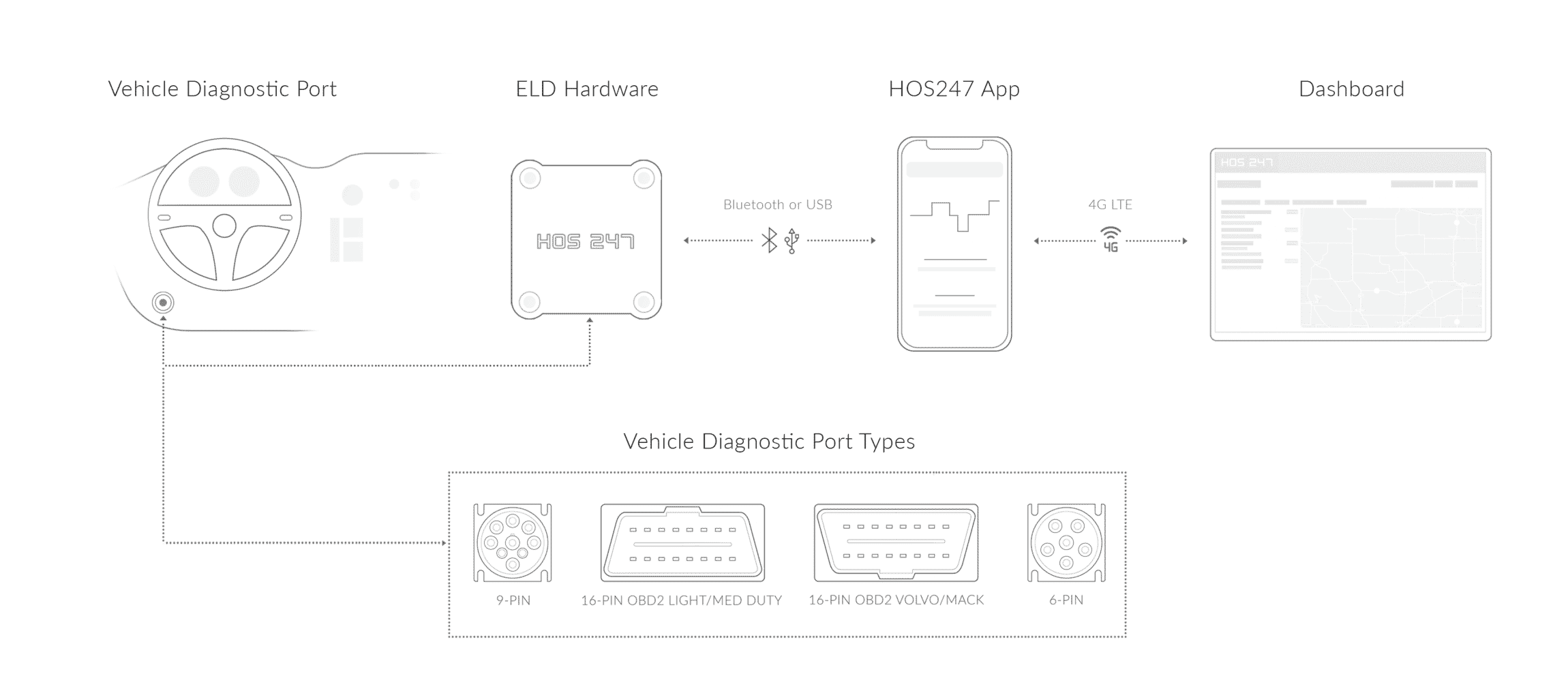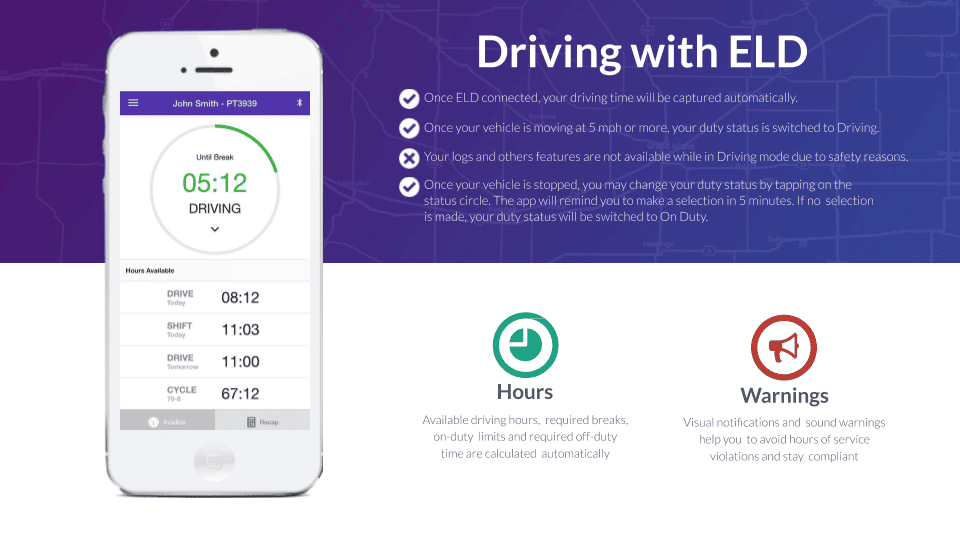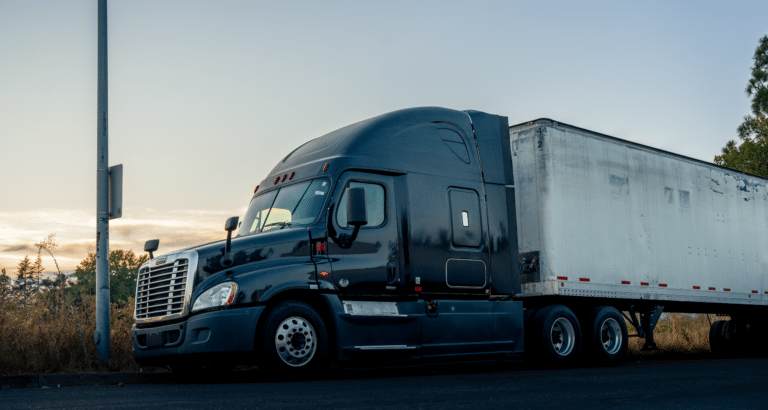Truck drivers and fleet managers have found a trustworthy digital truck logbook provider in HOS247. Our team has assembled a solution that drivers can rely on; it is approved by the FMCSA and keeps accurate HOS logs with minimal effort from the driver. Our user reviews show customers are satisfied with the performance and compliance of the log app and the responsiveness of our technical support team. HOS247 has many qualities and features to add value to your business and increase profits, including:
- All-around user-friendliness. We like to keep things simple and effective:
- Tried and tested high-quality hardware for durability. The installation is fast and straightforward.
- A stable Bluetooth connection keeps HOS logs accurate and updated at all times.
- The app and portal are easy to use and learn, and the logbook runs smoothly on the driver’s Android or iOS device of choice.
- Premium support. Our technical support channels are open in English, Spanish, Polish, and Russian. We are available every day of the week to help with any problem you may have on the road. If the call drops, we will call you back every time.
- Flexible options. The monthly subscription plan allows you to adjust the ELD service to your needs as you go. Also, we do not require you to sign a long-term contract; you can cancel anytime.
- Trial period. You deserve a test drive. Give HOS247 a try for two weeks. You can have your money back if you decide to return it within that time, no questions asked.
Do you have any questions? Talk to ELD Advisor: 650-405-3372 or Request Callback
How Does the HOS247 ELD Work?
The electronic logging device must connect to the engine control module using the diagnostic port. The digital truck log book then synchronizes with the vehicle, driver app, and fleet manager portal. The HOS247 ELD is designed for a quick setup, allowing you to have your elog up and running in no time.
The device will automatically record the date, time, location, engine hours, and vehicle miles, as well as vital information for identifying a specific driver, user, or motor carrier. This information will be displayed on the digital truck logbook app.
Note that the digital driver log book does not collect vehicle speed, braking, or steering information. It will only collect information to determine whether a driver is compliant with hours of service (HOS) regulations, such as when the vehicle is in motion and the engine is on and the driver’s changes of duty status, for instance, if they use the truck for personal errands or yard moves.

Can I Edit a Digital Truck Logbook Record?
ELDs automatically record the time a CMV is in motion as driving time: this cannot be changed to non-driving time. Yet, if there is a mistake or missing information in the elog, the driver can clarify it through the following actions:
- Edit. A change to the original record that does not overwrite the original.
- Annotation. This note relates to a record, update, or edit that a driver or authorized support personnel may input into the digital truck logbook.
The Code of Federal Regulations requires all edits to be annotated, stating the reason for the change, whether a driver or the carrier makes it. There are clear guidelines on how and when this is allowed. For example, if a driver forgets to change their status for the lunch break or starts the day with a non-driving task and does not change the status to On Duty, they would need a log edit to avoid a violation. The FMCSA has stated the following conditions for edits and annotations of electronic logging device records:
- An authorized staff member must add a note to a log edit describing its reason. This action counts as an annotation.
- Drivers are responsible for reviewing, certifying, and resubmitting the record. The driver has the final sign-off even if another authorized staff member makes an edit.
- The original ELD records are kept even if allowed edits and annotations are made. If the driver cannot independently access the records from the ELD, the motor carrier must provide access on request. However, the right to access is limited to six months, consistent with the period during which a motor carrier must retain drivers’ RODS.
How Can a Digital Truck Logbook Help Your Business
A reliable electronic logbook brings many benefits to truck drivers and carriers. To begin with, it improves the safety of drivers and others on the road by strengthening compliance with HOS rules and reducing driver fatigue. Logbooks also save time and work by improving the accuracy of records. Some additional advantages of a digital truck logbook are:
- Minimize administrative burden. You don’t have to worry about recording, saving, and storing RODS.
- Automated and straightforward process for keeping RODS.
- Improve HOS rule compliance with automated recording.
- Optimize office administration tasks.
- Reduce fuel waste. You can track exactly how much time the engine is running while the vehicle is not in motion. As a result, you can save thousands of dollars every month by reducing excessive idling.
- Vehicle diagnostics. An elog can monitor fault codes and send real-time alerts and detailed reports to the fleet manager. This feature allows them to plan the necessary vehicle maintenance and manage these issues ahead of time to achieve higher efficiency and productivity.

- Location tracking. GPS tracking technology helps make dispatch more efficient. The manager has a bird’s eye view of the entire fleet and of drivers’ remaining driving time to optimize load assignments, route management, and provide the customer with a more accurate ETA.
- Reduced liabilities. Lawsuits are something trucking businesses deal with every now and then. Having a digital truck log book can make the difference in these cases, serving as evidence of the driver’s innocence. This can prevent thousands of dollars in penalties.
- Lower insurance premiums. Insurance companies offer much better rates for fleets using ELDs. Additionally, since elogs are also packed with GPS tracking features, the risk of a stolen or hijacked vehicle is far less. This is another reason why insurance companies feel at ease when it comes to offering lower insurance rates.
- Better CSA scores. Several violations are entirely avoidable, such as Form & Manner violations, outdated log violations, and falsifying logs.
Do you have any questions? Talk to ELD Advisor: 650-405-3372 or Request Callback
Who Does the Mandate Apply to?
The ELD mandate applies to millions of commercial bus and truck drivers. If you keep RODS, you most likely have to comply with the mandate. Drivers living in Mexico and Canada are also required to follow the rules and regulations in the federal mandate if they engage in interstate commerce in the United States. Still, there are a few exemptions under the FMCSA rules that allow drivers to operate without an electronic logbook:
- Short-haul exemption. Allowed for drivers limited to a 150 air-mile radius from their home terminal. Timecards are still a valid option in these cases. RODS will not be required, so they will not be accountable for not using an electronic logbook system.
- 8-day exemption. If you are a driver keeping RODS for up to eight out of any 30 days, the use of an elog is not necessary.
- Driveaway-towaway operations. Electronic records are not mandatory if the commercial motor vehicle in question is the commodity being delivered.
- Pre-2000 engines. If the driver operates a vehicle with an engine manufactured before 2000, they are exempt from using electronic logbooks.

I’ve co-founded, built and managed several transportation-related businesses. Now, I’m a founder and CEO of HOS247 – an AI Transportation Platform for trucking companies, freight brokers and other logistics operations. We are transitioning old-style operations to technology-advanced logistics entities and help them to grow their businesses. ELDs (electronic logging devices), fleet tracking and management 2.0 combined with AI-powered dispatch tools.












Electronic logging devices (ELDs) aren’t going anywhere — they’re now a permanent part of trucking life. Whether you embraced the mandate early or held onto paper logs until the last possible moment, the reality is that every commercial driver needs

HOS247 Provides a Top-Rated Compliant ELD App for iPhone There are many ELD apps on the market. Unfortunately, only a fraction of those are reliable. When trying to choose the best vehicle logbook app for iPhone, it is important to

Navigating the world of commercial driving requires more than just the ability to maneuver a vehicle; it also involves a detailed approach to logging hours of service (HOS) as required by Transport Canada. These log books are indispensable for commercial